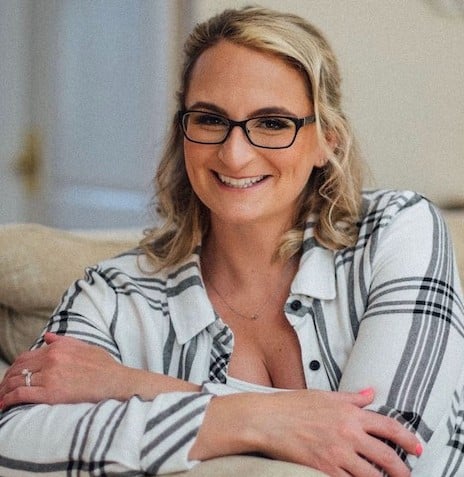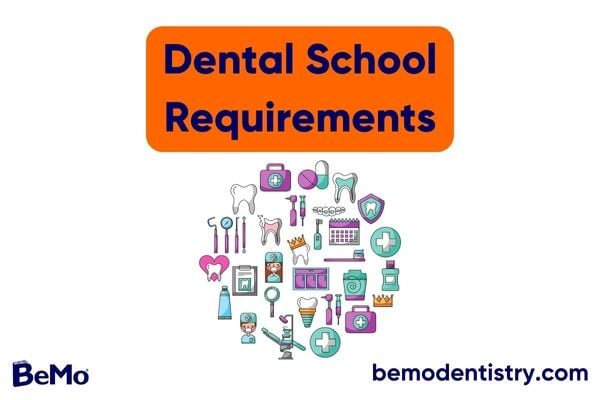Learn which dental school requirements you need to complete with this fun, easy-to-follow guide packed with tips that'll have you prepping your application in no time. Join our dental school admissions expert Dr. Amanda Thompson, DMD, as we uncover the essential steps to launching your dream career in dental care despite the ever-decreasing dental school acceptance rates
>>Want us to help you get accepted? Schedule a free initial consultation here <<
Listen to the blog!
Dental School Prerequisite Courses
Choosing the right dental school prerequisites is the first step towards getting accepted to dental school. While there are dental schools without prerequisites, most have some sort of course requirements which must be completed before applying. The most common prerequisites are:
- Biology,
- Chemistry, and
- Physics.
Some schools have additional requirements like:
- Biochemistry,
- Anatomy, and
- Physiology.
Be sure to check the specific academic requirements for each school you are applying to.
GPA and DAT Scores for Dental School
Your GPA holds significant weight in dental school admissions at schools across the US and Canada. Typically, you are expected to maintain a strong GPA with particular emphasis on performance in science courses. While specific minimum requirements vary, many schools look for a GPA of 3.5 to see you as a competitive candidate. Admissions committees also consider the trajectory of your GPA, valuing consistency or improvement over time as indicators of academic dedication.
In North America, a DAT score of 440 or higher (on a 200-600 score scale) will help you stand out to admissions committees, but some schools do accept applicants with lower scores. For example, A.T. Still University – Arizona School of Dentistry and Oral Health as well as University of Mississippi Medical Center School of Dentistry accept some candidates with a DAT score of 410. In Canada, three dental schools might consider applications of students with a DAT score as low as 330. These schools are Laval University Faculty of Dentistry, University of Alberta Faculty of Dentistry, and University of Saskatchewan Faculty of Dentistry.
It is important to score as high as possible on the DAT to strengthen your application and set you apart from other candidates. Here are some tips to help you do well on the test:
Set up a DAT study schedule.
- Plan to study for at least three months before taking the test.
- Take a practice test to establish your baseline. Then, take more practice tests later on to gauge your improvement and get used to the format and presentation of the DAT.
- Start by studying your areas of most difficulty and improving your knowledge in these subjects.
- Research the perceptual ability test and do similar practice activities.
- Study complex passages and work on your reading comprehension.
If you don’t succeed on your first try at the DAT, you can take it again after 90 days up to a maximum of three times.
Undergraduate Degree Required for Dental School
The good news is that there is no single best undergraduate degree required for dental school. To apply to dental school, you typically need a bachelor's degree from an accredited institution, but there are a few dental schools that offer early admission to students with only two to three years of undergraduate education. These requirements do change often, so make sure to check with your schools of choice.
Dental School Essays
Dental School Personal Statement
The dental school personal statement is your chance to shine and showcase your passion for dentistry. These statements are typically 4,500 characters and provide you with the opportunity to share information that the admissions committee hasn’t already seen on your transcripts or resume.
Your personal statement should include:
- Why you want to be a dentist and your professional aspirations
- Answers to any specific prompts or questions
- Defining moments that sparked your interest in dentistry
- Up to three examples that demonstrate your suitability for a career in dentistry
- And potentially any additional information that can dispel concerns about a low GPA or DAT score
Dental School Supplemental Application
Depending on the school, you may need to submit a dental school supplemental application. Supplemental materials can include essays or short answers to questions, such as “why this dental school?” Check each school you’re interested in to find out whether they require a supplemental application.
Dr. Amanda Thompson offers this seemingly obvious but often overlooked advice about your dental school application:
“Don’t rush! Make sure you take time to craft your personal statement and secondary essays. Double and triple check your application for typographical and grammatical errors. The details count, especially in dentistry.” - Dr. Amanda Thompson, DMD, Case Western Reserve University’s School of Dental Medicine
Dental School Letters of Recommendation
In general, you are asked to submit up to four dental school letters of recommendation, although some schools may request supplemental letters. There are three types of recommendation letters accepted by dental schools:
- Individual Letters: Written by individual professors, advisors, dentists, or other professionals qualified to recommend you.
- Committee Letters/Packets: Includes feedback and insights from an advising committee and is often based on student interviews. An advisor synthesizes comments from all evaluators to write the letter.
- Composite Letters: Similar to a committee letter but with a few committee members writing notes or letters about the student. It is submitted to an advisor who then writes a cover letter based on the committee's notes.
To help referees write an honest and impactful letter, make sure to do the following:
• Provide them with relevant information that highlights specific examples showcasing your skills and dedication to dentistry.
• Communicate your professional goals so they can align recommendations with your objectives.
• Offer specific examples that illustrate your strengths.
• Provide ample time to complete the letter.
CASPer Test for Dental School
In addition to the DAT, the CASPer test is sometimes required for dental school. The importance of your CASPer score can vary by school. For some, it’s a key part of the decision, while others use it as a tiebreaker between similar applicants.
Preparation involves practicing with sample questions, developing critical thinking skills, reflecting on personal experiences, and seeking feedback.
In the United States, the following dental schools require the CASPer test:
- California Northstate University College of Dental Medicine
- Case Western Reserve University School of Dental Medicine
- High Point University School of Dental Medicine
- Temple University Kornberg School of Dentistry
- University of California Los Angeles School of Dentistry- (PPID)
- University of Colorado School of Dental Medicine - Advanced Standing International Student Program (ISP)
- University of Detroit Mercy Dentistry
- University of Louisville School of Dentistry
- University of Utah School of Dentistry
In Canada, the following dental schools require you to take the Canadian Professional Health Sciences test (CSP-10201) via CASPer:
- McGill University
- University of Alberta
- University of Montreal
- University of Toronto
- Western University
Extracurricular Requirements for Dental School
Extracurricular requirements for dental schools are not just nice to have, they are an essential component of your dental school application experiences section. Admissions committees want to see a focus on extracurricular activities that develop skills and competencies you will need to be a successful dentist.
We’ve compiled a list of some of the best dental school extracurriculars:
Our expert Dr. Amanda Thompson, DMD, has some important insights on what admissions committees are looking for:
“I found that dental school admissions committees were most interested in the activities that I had invested a lot of time in. There were a few clubs that I was involved in for only a semester or two, but I volunteered for several organizations for a period of multiple years. I got many more questions and comments about the activities in which I was involved in for longer. Longevity and dedication are key!” – Dr. Amanda Thompson, DMD, Case Western Reserve University’s School of Dental Medicine
Shadowing a Dentist
When applying to dental school, one experience you'll need is shadowing a dentist. Shadowing offers insights into the daily workings of a dental practice and patient interactions.
Here are some expert tips to make the most of your shadowing experience:
• Start Early and Be Consistent: Begin shadowing in your undergraduate years and maintain regularity.
• Seek Diversity: Shadow dentists with varied specialties and patient demographics to broaden exposure and insight.
• Take Notes and Reflect: Journal your observations and reflections to articulate gained skills and qualities for applications.
• Build Relationships: Foster connections with dentists for impactful letters of recommendation and guidance.
• Adhere to Requirements: Research and follow shadowing requirements of prospective dental schools closely.
Our dental school admissions expert Dr. Amanda Thompson, DMD, found shadowing extremely helpful.
“Shadowing is highly encouraged! It gives you the chance to see what the day-to-day of a dentist will be like. I enjoyed shadowing dentists in different fields (e.g.: general dentistry, oral surgery) to see what the similarities and differences between specialties” – Dr. Amanda Thompson, DMD Case Western Reserve University’s School of Dental Medicine
Manual Dexterity
Manual dexterity is a crucial requirement for performing precise and safe dental procedures. During your application process, this skill is assessed through several methods:
- Dental Admission Test (DAT): The DAT includes the Perceptual Ability Test (PAT), which evaluates spatial reasoning and manual dexterity, essential for dental work.
- Manual Dexterity Tests: Some dental schools require applicants to complete specific manual dexterity tests, involving tasks like threading a needle or assembling small objects under time constraints.
- Interviews and Personal Statements: Admissions committees may ask about experiences demonstrating manual dexterity. Highlighting relevant activities or hobbies that develop this skill can enhance your application.
Dental School Interviews
Dental school interview requests are usually extended as part of the supplemental application process. Interviews may be traditional, panel, or MMI-style. During interviews, candidates are assessed on their communication skills, leadership qualities, and understanding of healthcare ethics. Asking thoughtful questions also demonstrates your interest and suitability for the school.
How to prepare for a dental school interview is a challenge for every would-be student of dentistry and oral health care. The best way is to practice with mock interviews.
FAQs
1. Are prerequisite courses a requirement for dental school?
Yes, you will need to take biology, chemistry, and physics for admission to all dental schools. In addition, specific schools may have other required courses, such as biochemistry, anatomy, physiology. English, mathematics, with arts, social sciences, and humanities.
2. Can I get into dental school without a college/university degree?
In most cases, you will need a bachelor’s degree to apply to dental school, but some schools may accept a certain number of completed credits.
3. What GPA is required for dental school?
You’ll want to maintain a college/university GPA of at least 3.5 to be accepted to a competitive dental program.
4. What is a good DAT score for dental school?
A score between 420 out of 600 is good, and 440 and above is considered competitive.
5. What is the best major for dental school?
The best major is the major that will help you get the highest GPA!
6. Is shadowing a dental school requirement?
As a rule, shadowing hours are a very important addition to your dental school application unless you plan to study in Canada, where this is much less important.
7. Is lab work a dental school requirement?
Yes, along with your science prerequisites, you will need to fulfill lab work requirements to apply to most dental schools.
8. When do I apply to dental schools using AADSAS?
You can send in your application as soon as June. Apply early! Early applicants have a better chance of being invited to an interview.

